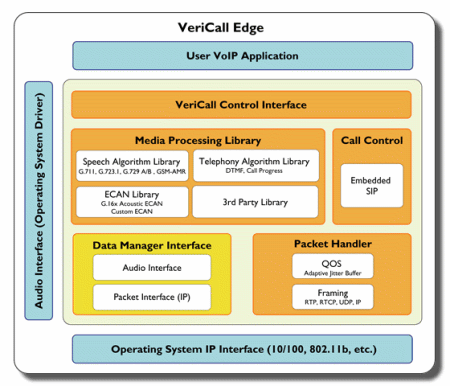Software-only VoIP solution to ship first on embedded Linux
Sep 24, 2003 — by LinuxDevices Staff — from the LinuxDevices Archive — 29 viewsTrinity Convergence, a developer of embedded communications software for telecommunications equipment manufacturers, has launched a unique software-only Voice over IP (VoIP) solution to beta test in Q4, 2003 and ship Q1, 2004 for embedded Linux, with support for other platforms to follow.
According to Trinity, its new VeriCall Edge platform allows developers to add VoIP functionality to client devices and handsets without the need for costly and power hungry external hardware such as VoIP ASICs or Digital Signal Processors (DSPs). The application processors and cores used today in high volume, low cost, and low power client devices deliver sufficient computing power to run VeriCall Edge, according to Trinity, without additional hardware.
“Application processors used in today's client devices have become powerful enough to handle tasks that once required a stand alone DSP,” said Will Strauss, president of market research firm Forward Concepts. “Trinity recognized this and [built] an edge-optimized software platform for cost and power sensitive VoIP-enabled client devices.”
According to Trinity, a typical edge device for VoIP uses a tandem DSP and application processor hardware architecture. The DSP performs complex media processing tasks, while the application processor performs control and signaling functions. A dual chip solution results in complexity, increased development and deployment costs, and added size and power consumption, the company says.
“VeriCall Edge represents a significant shift in VoIP edge equipment design,” claims Salim Bhatia, chief executive officer of Trinity Convergence. “This novel approach allows OEMs to introduce VoIP capabilities into existing designs with minimal disruption to their architecture. Furthermore, developers of new VoIP edge equipment now have an open and flexible platform to rapidly create differentiable products.”

VeriCall Edge architecture
Trinity says VeriCall Edge includes the principal VoIP functions:
- G.711, G.726, G.729 A/B, GSM/AMR, EVRC, and SMV voice coders
- voice activity detect
- packet loss concealment
- acoustic and line echo cancellers
- DTMF detect and generate
- jitter buffer manager
- RTP/RTCP/UDP/IP, and an embedded SIP stack for call control
Trinity calls VeriCall Edge “ideal enabling software for one to eight channels of compressed VoIP for IP phones, multi-network (mobile/Wi-Fi) handsets, integrated access devices, broadband access devices, and other VoIP-enabled edge devices.”
VeriCall Edge is written in portable C, and Trinity intends to ship versions optimized for ARM9E, MIPS32 and MIPS64, Intel XScale, and Motorola PowerQUICC II & III processors and cores. The initial release of VeriCall Edge will be under embedded Linux, with future support for VxWorks, Symbian OS, and Microsoft CE .NET.
This article was originally published on LinuxDevices.com and has been donated to the open source community by QuinStreet Inc. Please visit LinuxToday.com for up-to-date news and articles about Linux and open source.